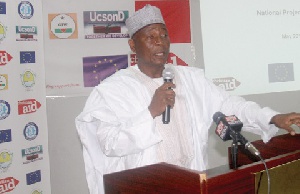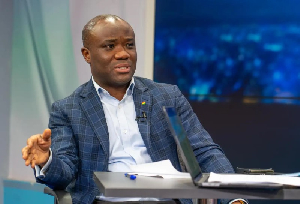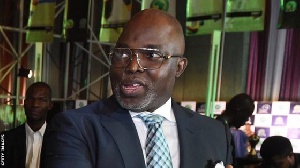Alhaji Boniface Abubakar Saddique, the Minister of Inner City and Zongo Development, has hailed the University of Ghana (UG) for initiating the Ghana-Well-Being Project with the private sector.
He said the project would go a long way to complement government’s efforts in eradicating poverty.
He said the project was appropriate at this time of Ghana’s development.
Alhaji Saddique gave the commendation on Monday in his address at the opening of week-long of the Economic Inclusion and Poverty Eradication Workshop, dubbed: “Workshop for Strategy, Planning and Project Implementation.”
The workshop, which is being organised by the Institute of Applied Science and Technology, UG, is part of the Ghana Economic Well-Being Project.
The project is designed to engage academia, investors and the public in the general economic development of Ghana through the adoption of practical solutions and innovative technologies.
It is a co-operation between Bulaiza PLC and the Institute of Applied Sciences & Technology, UG.
The Ghana Economic Well-Being Project is an “open source” project allowing any interested party to join as a development partner.
It is, therefore, highly geared towards participatory engagements with the public and consequently, able to deliver programmes within the framework of the Ghana Economic Well-Being Project.
The workshop outcome will be a very useful resource and aid to policy-makers and the general government agenda for poverty reduction (in Ghana’s, case, eradication).
Alhaji Saddique said: “This project complement’s the President’s vision to transform Ghana into a modern industrialised state, offering equal opportunity for all to contribute towards the creation and development without bias.”
“The President’s desire is to develop a society where there is fair, equitable distribution of the ‘fruits of state’. It must be mentioned that it is preferable that we develop a state in which dependency mentality is minimal or non-existent,” he added.
He said it was evident that poverty did not exist in our rural areas but was pervasive in each of our cities.
He said various programmes were being implemented to empower sections of society, which had been left out of the development process through no fault of theirs.
He noted that the current programmes were meant to remove obstacles that had constrained their active participation due to various biases.
He said the development at the Zongos and the Inner Cities would be a manifestation of the success of these programmes.
Mrs Gifty Twum Ampofo, the Deputy Minister of Gender, Children and Social Protection, said Ghana’s Social Protection Policy aimed at consolidating the wide range of national programmes and projects into a coherent framework that effectively tackled extreme poverty and vulnerability as well as promoting employment and productivity.
She explained that the national framework sought to protect the poorest, promote productivity, and put in place a complete system of accessible and quality social services for all.
Professor Ebenezer Oduro Owusu, the Vice Chancellor, UG, said the project would create opportunities for access to generate statistical economic growth through knowledge generation and private sector participation.
He said the project also aimed at unlocking the potentials of individuals and communities, to improve their circumstances through job creation.
The Vice Chancellor said the project also sought to bridge the gap between academia and industry to the benefit of the grassroots development.
Prof George Nkansah, the Director of the Institute of Applied Sciences and Technology, UG, said government’s policy would have to reflect its commitment to support the eradication of poverty.
“We cannot leave poverty eradication to government alone. All of us and specially, the business community must be in the forefront, with the government rather behind giving us the push,” he stated.
Dr Noskim Atidigah, the General Manager, Federated Co-Operative Multi-Purpose Society Limited, said there was the need for government to raise capital for acquiring modern agriculture systems and technology.
General News of Tuesday, 15 August 2017
Source: ghananewsagency.org

















